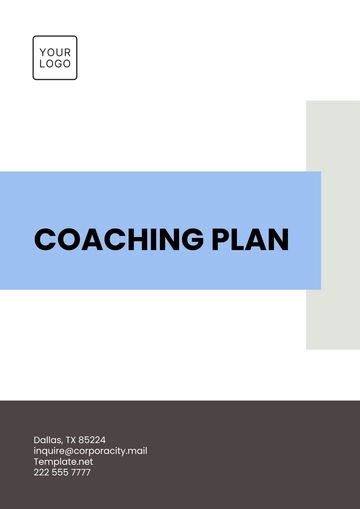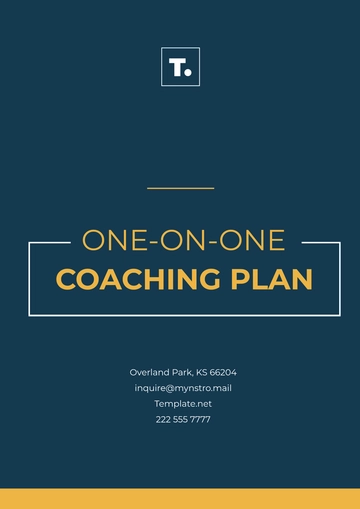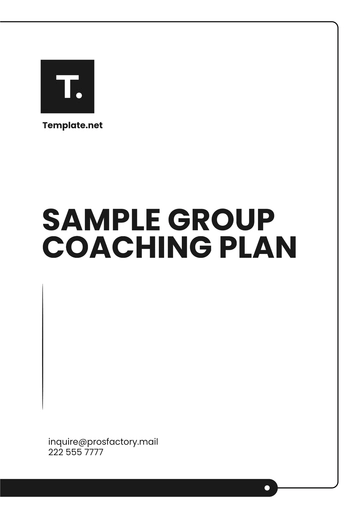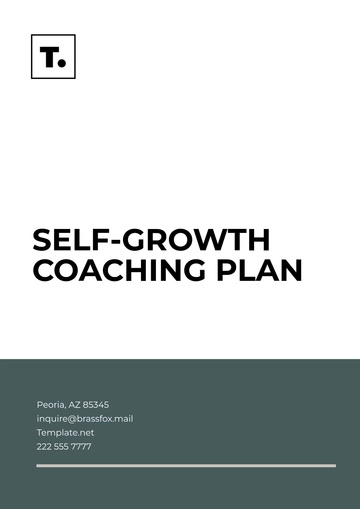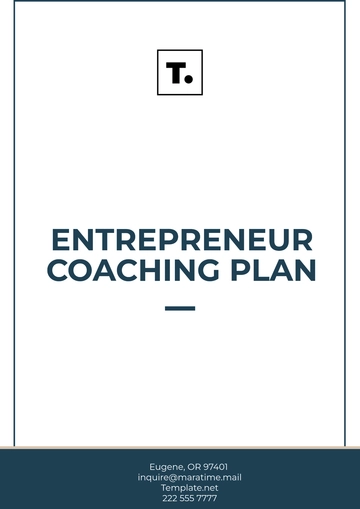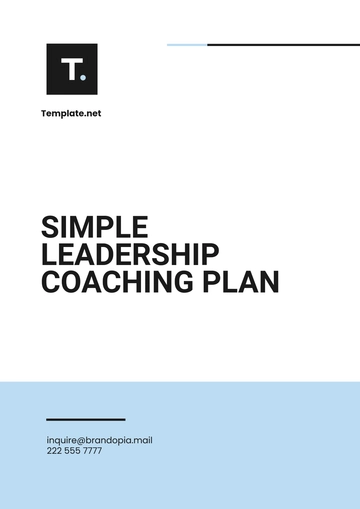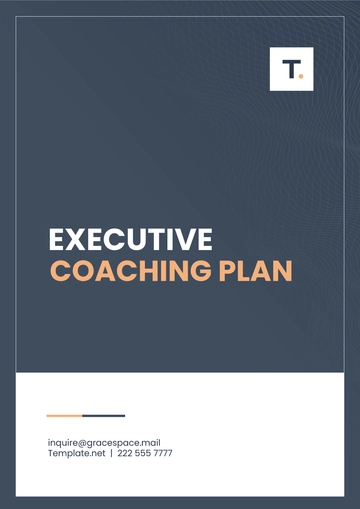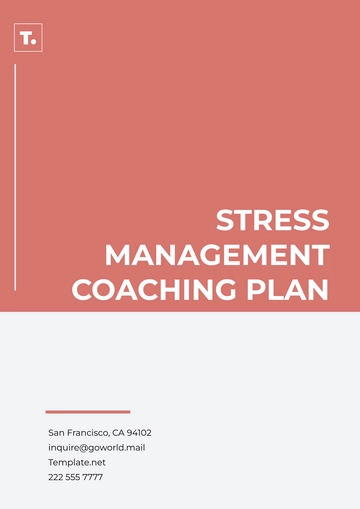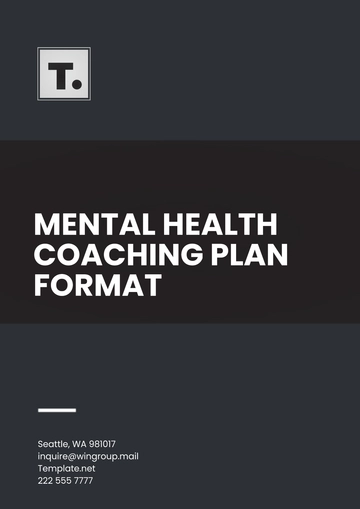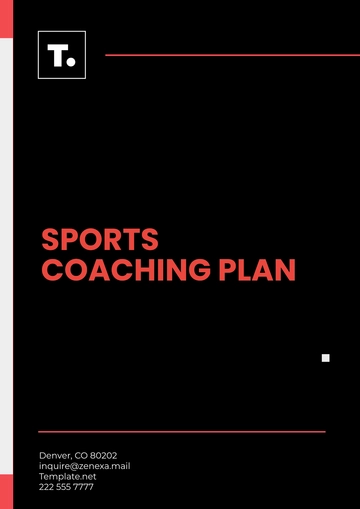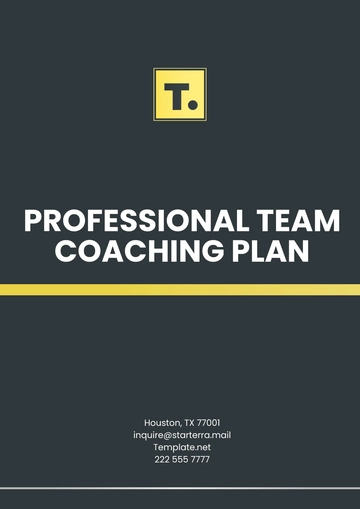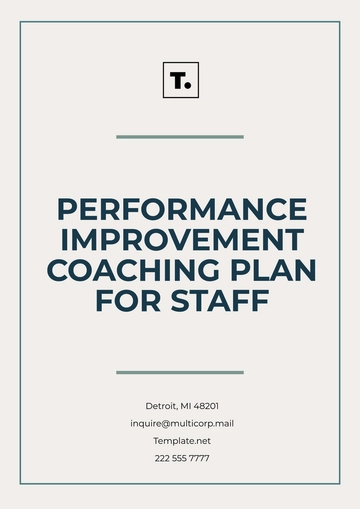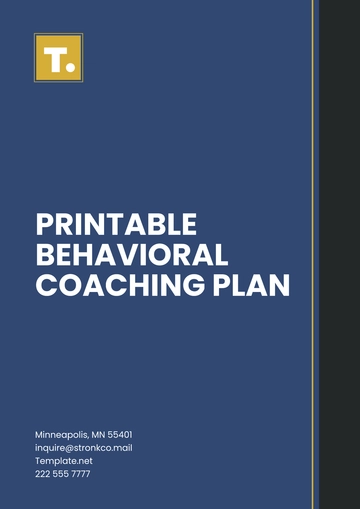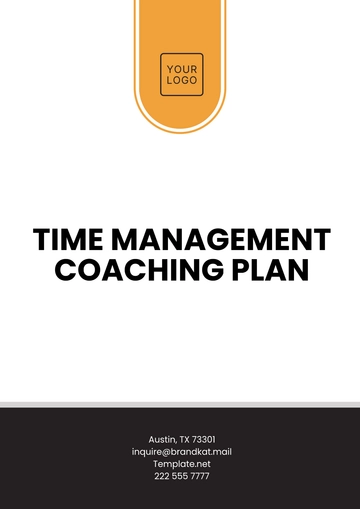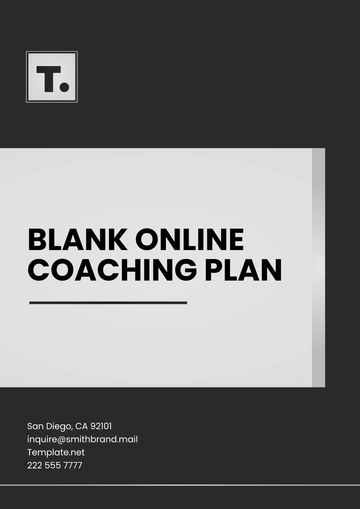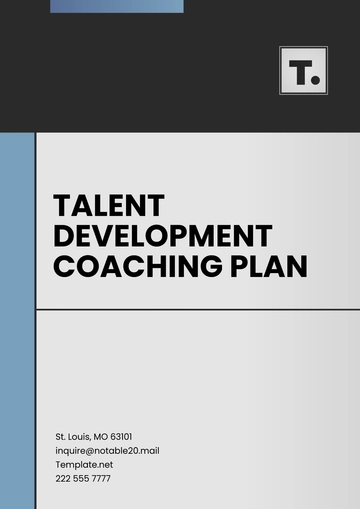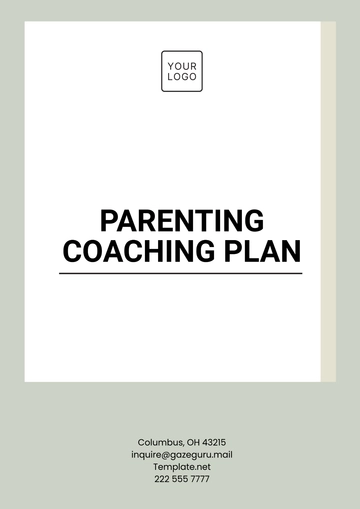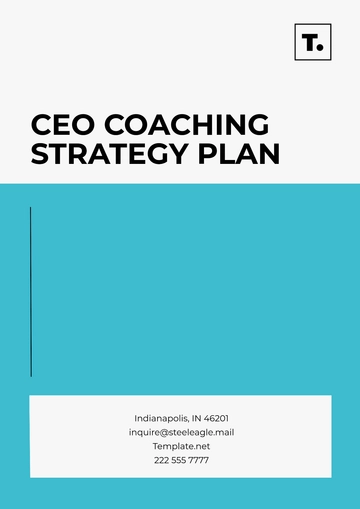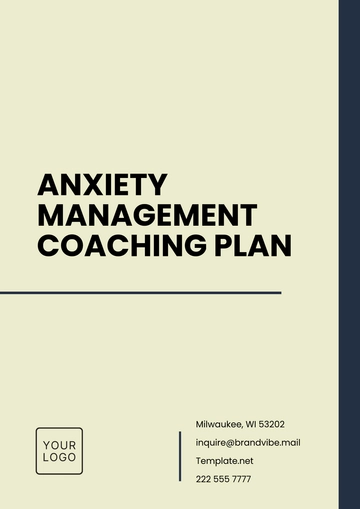Free Entrepreneur Coaching Plan
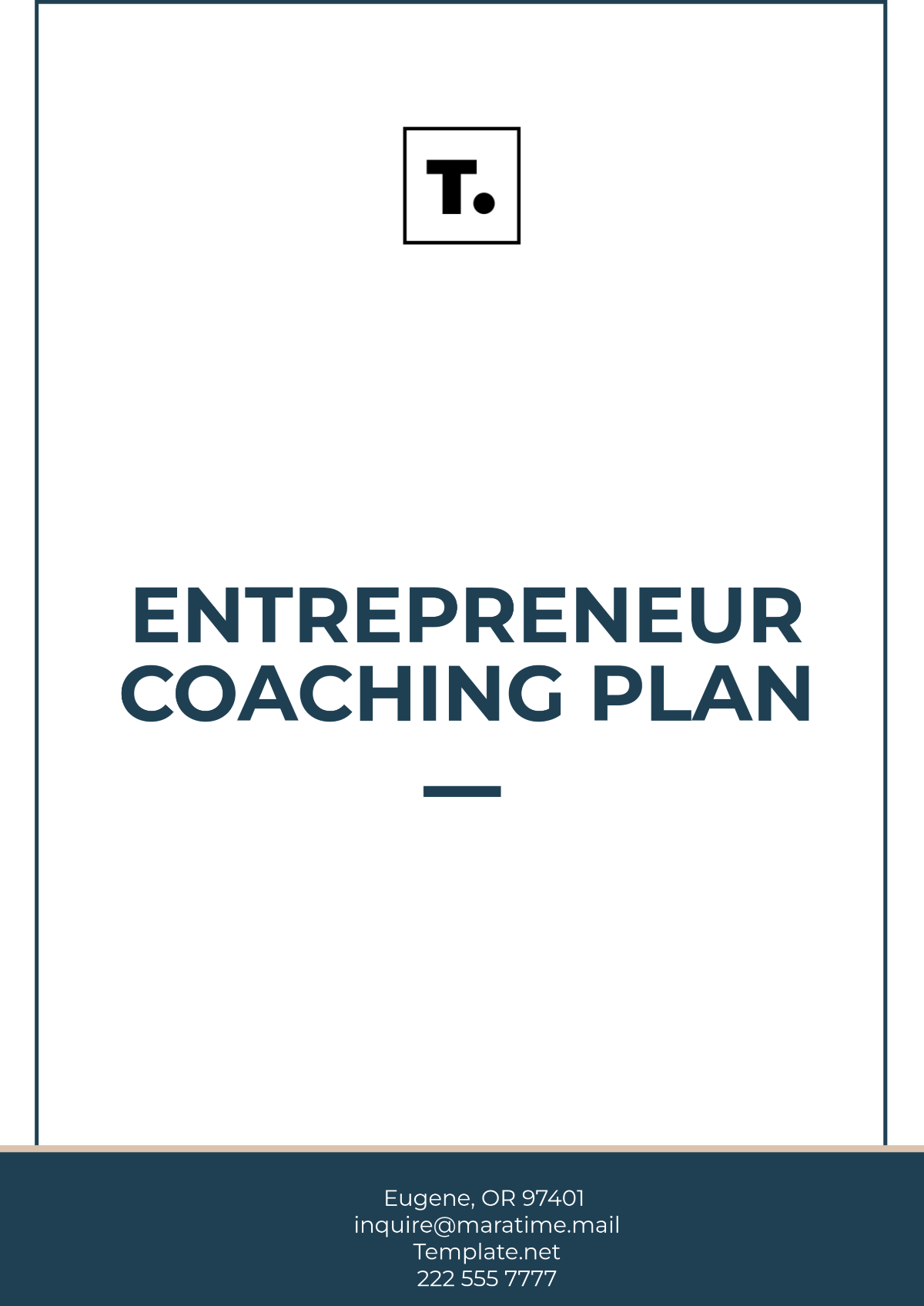
Prepared by: [Your Name]
Date: [Date]
I. Introduction and Overview
The Entrepreneur Coaching Plan is designed to provide a clear framework for guiding entrepreneurs towards achieving their business goals. This plan offers personalized coaching, resources, and strategies to address challenges, enhance leadership skills, and foster business growth. It is tailored to meet the specific needs of the entrepreneur, ensuring alignment with both short-term and long-term objectives.
II. Goals and Objectives
The primary objective of this plan is to empower the entrepreneur with the tools and guidance necessary to succeed. Specific goals may include:
A. Short-Term Goals
Develop a clear and actionable business plan.
Identify key target markets and potential clients.
Establish a social media presence and marketing strategy.
B. Long-Term Goals
Scale the business sustainably.
Build a strong, cohesive team.
Achieve financial stability and profitability.
III. Action Plan
This section outlines the steps required to achieve the defined goals. The action plan is broken into actionable items with a focus on key areas such as marketing, operations, and leadership.
A. Marketing and Sales
Develop a brand strategy and define a unique value proposition.
Create a content marketing plan to engage potential customers.
Launch targeted advertising campaigns for lead generation.
B. Operations and Business Development
Streamline processes to improve efficiency.
Identify potential partnerships for business growth.
Create systems for project management and task delegation.
C. Leadership and Personal Growth
Attend leadership training to enhance decision-making skills.
Regular self-assessment to identify areas for personal development.
Schedule consistent coaching sessions to address leadership challenges.
IV. Timeline
This section outlines a timeline for the execution of the action plan, specifying when each goal and action will be accomplished.
A. Short-Term Milestones
First month: Complete market research and refine the business plan.
Second month: Establish an online presence and launch the first marketing campaign.
Third month: Start building a team and improve internal processes.
B. Long-Term Milestones
Sixth month: Assess business growth and adjust strategies accordingly.
One-year mark: Evaluate overall business performance, profitability, and scaling opportunities.
V. Progress Tracking
Regular monitoring of progress is crucial to the success of the Entrepreneur Coaching Plan. The following methods will be used to track progress:
A. Weekly Check-ins
Assess short-term goals and ensure alignment with long-term objectives.
Address any immediate challenges or obstacles that arise.
B. Monthly Reviews
Evaluate marketing effectiveness and sales progress.
Track financial health and adjust strategies for sustainability.
C. Quarterly Evaluation
Review personal growth and leadership development.
Adjust the action plan based on business performance and market changes.
VI. Support and Resources
Throughout the coaching process, the entrepreneur will have access to various resources and support systems, including:
A. Sessions
One-on-one coaching with an experienced business mentor.
Group coaching for collaborative problem-solving and idea-sharing.
B. Tools and Templates
Access to business planning templates, financial forecasting tools, and marketing resources.
Online workshops and webinars to enhance business knowledge.
C. Networking Opportunities
Invitations to entrepreneurial networking events and workshops.
Access to a community of like-minded entrepreneurs for peer support.
VII. Feedback and Adjustments
Continuous improvement is a key aspect of the coaching plan. Feedback will be gathered through the following methods:
A. Self-Assessment
Regular reflection on progress and personal growth.
Identifying strengths and areas for improvement.
B. Coach Feedback
Constructive feedback from the coach during regular check-ins.
Adjustments to the action plan based on ongoing challenges and results.
C. Client Feedback
Gather feedback from customers and team members to assess satisfaction and areas for improvement.
Use this feedback to refine business strategies and improve the customer experience.
- 100% Customizable, free editor
- Access 1 Million+ Templates, photo’s & graphics
- Download or share as a template
- Click and replace photos, graphics, text, backgrounds
- Resize, crop, AI write & more
- Access advanced editor
Support aspiring entrepreneurs with the Entrepreneur Coaching Plan Template from Template.net. This editable and customizable plan helps you create a comprehensive roadmap for business growth, from setting clear goals to improving strategies. The Ai Editor Tool allows for seamless adjustments, making it easy to tailor the plan to suit the specific needs of each client. Whether you’re coaching a startup founder or a seasoned business owner.
You may also like
- Finance Plan
- Construction Plan
- Sales Plan
- Development Plan
- Career Plan
- Budget Plan
- HR Plan
- Education Plan
- Transition Plan
- Work Plan
- Training Plan
- Communication Plan
- Operation Plan
- Health And Safety Plan
- Strategy Plan
- Professional Development Plan
- Advertising Plan
- Risk Management Plan
- Restaurant Plan
- School Plan
- Nursing Home Patient Care Plan
- Nursing Care Plan
- Plan Event
- Startup Plan
- Social Media Plan
- Staffing Plan
- Annual Plan
- Content Plan
- Payment Plan
- Implementation Plan
- Hotel Plan
- Workout Plan
- Accounting Plan
- Campaign Plan
- Essay Plan
- 30 60 90 Day Plan
- Research Plan
- Recruitment Plan
- 90 Day Plan
- Quarterly Plan
- Emergency Plan
- 5 Year Plan
- Gym Plan
- Personal Plan
- IT and Software Plan
- Treatment Plan
- Real Estate Plan
- Law Firm Plan
- Healthcare Plan
- Improvement Plan
- Media Plan
- 5 Year Business Plan
- Learning Plan
- Marketing Campaign Plan
- Travel Agency Plan
- Cleaning Services Plan
- Interior Design Plan
- Performance Plan
- PR Plan
- Birth Plan
- Life Plan
- SEO Plan
- Disaster Recovery Plan
- Continuity Plan
- Launch Plan
- Legal Plan
- Behavior Plan
- Performance Improvement Plan
- Salon Plan
- Security Plan
- Security Management Plan
- Employee Development Plan
- Quality Plan
- Service Improvement Plan
- Growth Plan
- Incident Response Plan
- Basketball Plan
- Emergency Action Plan
- Product Launch Plan
- Spa Plan
- Employee Training Plan
- Data Analysis Plan
- Employee Action Plan
- Territory Plan
- Audit Plan
- Classroom Plan
- Activity Plan
- Parenting Plan
- Care Plan
- Project Execution Plan
- Exercise Plan
- Internship Plan
- Software Development Plan
- Continuous Improvement Plan
- Leave Plan
- 90 Day Sales Plan
- Advertising Agency Plan
- Employee Transition Plan
- Smart Action Plan
- Workplace Safety Plan
- Behavior Change Plan
- Contingency Plan
- Continuity of Operations Plan
- Health Plan
- Quality Control Plan
- Self Plan
- Sports Development Plan
- Change Management Plan
- Ecommerce Plan
- Personal Financial Plan
- Process Improvement Plan
- 30-60-90 Day Sales Plan
- Crisis Management Plan
- Engagement Plan
- Execution Plan
- Pandemic Plan
- Quality Assurance Plan
- Service Continuity Plan
- Agile Project Plan
- Fundraising Plan
- Job Transition Plan
- Asset Maintenance Plan
- Maintenance Plan
- Software Test Plan
- Staff Training and Development Plan
- 3 Year Plan
- Brand Activation Plan
- Release Plan
- Resource Plan
- Risk Mitigation Plan
- Teacher Plan
- 30 60 90 Day Plan for New Manager
- Food Safety Plan
- Food Truck Plan
- Hiring Plan
- Quality Management Plan
- Wellness Plan
- Behavior Intervention Plan
- Bonus Plan
- Investment Plan
- Maternity Leave Plan
- Pandemic Response Plan
- Succession Planning
- Coaching Plan
- Configuration Management Plan
- Remote Work Plan
- Self Care Plan
- Teaching Plan
- 100-Day Plan
- HACCP Plan
- Student Plan
- Sustainability Plan
- 30 60 90 Day Plan for Interview
- Access Plan
- Site Specific Safety Plan
